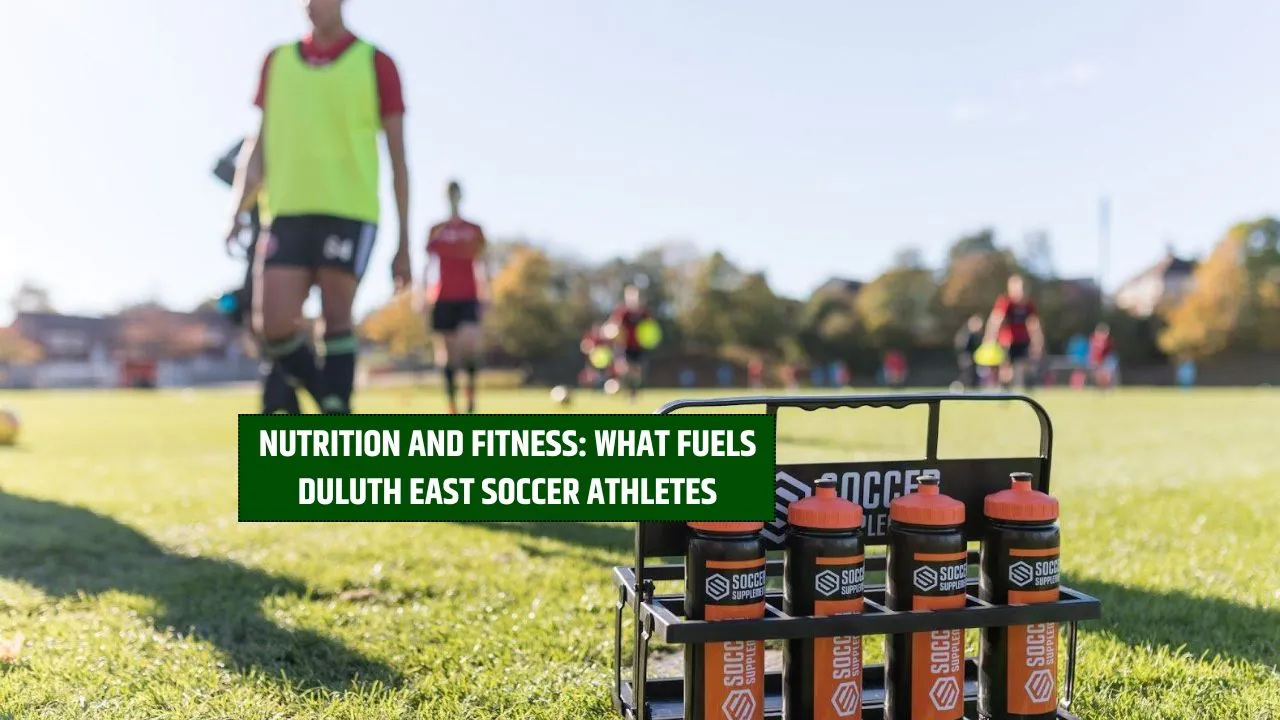Duluth East Soccer continues to set a high standard not only in competitive play but also in how it prepares its student-athletes off the field. From early morning practices to intense match days, these athletes understand that long-term success requires more than just natural talent—it takes dedication to health, discipline, and balance.
This article dives into the unique routines and strategies that fuel Duluth East Soccer players, focusing on what they eat, how they train, and the systems in place to help them thrive as both students and athletes. You’ll get a detailed look at how they maintain peak condition through proper nutrition and consistent fitness habits. Whether you’re a young athlete, a parent, or a coach, there’s something here to learn from the habits behind their performance.
Duluth East Soccer: Where Nutrition and Fitness Drive Success
The strength of Duluth East Soccer lies in the everyday commitment of its players to a healthy, active lifestyle. This isn’t just a school team—it’s a culture of young athletes who train with intention and fuel with purpose. Nutrition and fitness form the foundation of their success, shaping both their performance on the field and their overall well-being. With carefully planned meals, focused workout routines, and an understanding of how physical health impacts academic and mental performance, Duluth East Soccer sets an example for school sports programs across the state. Their dedication goes beyond wins and losses—it’s about building athletes for life.
Overview: Daily Life of a Duluth East Soccer Athlete
| Aspect | Routine/Details |
| Diet Focus | Balanced meals, high in protein and complex carbs |
| Hydration | 6–10 cups of water daily, plus electrolytes during games and hot weather |
| Fitness Training | Mix of endurance, speed drills, strength training, and flexibility work |
| Pre-Game Preparation | Light, carb-heavy meals and hydration 2–3 hours before game time |
| Post-Game Recovery | Protein-rich meals and stretching routines |
| Academic Balance | Daily schedules with time set aside for study, rest, and practice |
| Mental Health Support | Team bonding, coach check-ins, motivational talks |
| Sleep | 7–9 hours of sleep nightly for full physical and mental recovery |
How Duluth East Soccer Athletes Prioritize Nutrition
Nutrition is not a background detail for these athletes—it’s central to how they prepare. The coaching staff encourages players to think of food as fuel. Meals are timed strategically around practices and matches to maintain stamina and aid recovery. For breakfast, players often opt for complex carbohydrates like oatmeal or whole-grain toast paired with protein such as eggs or yogurt. Lunches focus on lean meats, fresh vegetables, and whole grains, while dinners might include grilled chicken, brown rice, and a side of steamed greens.
Snacks like almonds, fruit, or protein bars are common between school and practice. By choosing nutrient-dense foods, players improve their focus in class and their endurance during training. Fast food and sugary drinks are discouraged—not because of strict rules, but because players feel the difference when their bodies are properly fueled.
The Role of Fitness in Performance
Training at Duluth East Soccer is designed to build well-rounded athletes. Speed, strength, and agility are all part of the weekly regimen. Instead of focusing only on skill work, the program emphasizes long-term physical development. Cardio sessions include interval runs and endurance drills, often mixed with soccer-specific movement to mimic game situations. Strength training might involve bodyweight circuits or free weights for core and lower body power.
Flexibility is equally important. Players begin and end each practice with dynamic and static stretching to improve range of motion and reduce the risk of injury. This balanced training structure helps the team remain resilient through long seasons and intense matches.
Training Routine and Schedule
A typical week for Duluth East Soccer players is a carefully managed balance between schoolwork and athletic training. Practices take place after school and can run for 90 minutes to two hours, depending on the season and game schedule. Early in the season, conditioning is a priority—longer runs, fitness tests, and strength workouts dominate the agenda. As the season progresses, technical skills and team formations become more central.
Weekend sessions, film study, and recovery days are also incorporated to allow players to both push hard and recover smart. Off-season training often includes gym sessions, club soccer, or personalized fitness programs to maintain sharpness and prevent burnout.
Pre-Game and Post-Game Meals
Pre-Game Nutrition:
- A light meal 2–3 hours before kickoff
- Example: pasta with a small amount of chicken, or a smoothie with oats and banana
- Hydration starts early—athletes are encouraged to drink water throughout the day
Post-Game Recovery Meals:
- Protein intake within 30–60 minutes post-game to rebuild muscles
- Example: grilled salmon with sweet potatoes or a chocolate milk with fruit and granola
- Stretching and foam rolling help reduce muscle soreness and speed recovery
Balancing Academics and Athletic Life
One of the most challenging parts of being a student-athlete is balancing the classroom with the soccer field. At Duluth East Soccer, this balance is treated as essential—not optional. Time management is a learned skill, supported by both coaching staff and academic advisors. Athletes use planners, digital calendars, and weekly check-ins to stay on top of assignments and exams.
Missing class for travel games isn’t uncommon, so players often work ahead or communicate with teachers early to stay caught up. Prioritizing rest is also key—students are encouraged not to overcommit to other activities during the season, ensuring time for recovery and study.
Mental Health and Motivation
The pressure to perform in both academics and sports can take a toll on mental health. That’s why Duluth East Soccer takes a proactive approach to mental wellness. Players are taught mindfulness and breathing techniques to use before high-stress games. Coaches check in with players not only on performance but on personal well-being. The result is a strong team culture where players feel supported and safe to express themselves.
Motivation is maintained through shared goals, small victories, and team bonding activities. It’s not just about winning—it’s about building confidence, discipline, and resilience.
Top Nutritional Tips Followed by Duluth East Soccer Athletes
- Prioritize complex carbs for lasting energy
- Include protein in every meal to aid recovery
- Hydrate early and often—don’t wait until practice
- Choose whole foods and avoid processed snacks
- Don’t skip meals; even small snacks keep energy stable
Key Fitness Activities in the Duluth East Soccer Program
- Agility ladders and cone drills to improve footwork
- Sprint intervals for explosive speed
- Bodyweight circuits (push-ups, squats, lunges)
- Long-distance runs for endurance
- Cool-down stretches and core strengthening routines
FAQs
1. What kind of diet do Duluth East Soccer players follow?
They follow a balanced, athlete-focused diet rich in protein, complex carbs, and healthy fats, avoiding junk food and sugary drinks.
2. How often do Duluth East Soccer athletes train each week?
Typically five to six days a week, including practices, fitness work, recovery, and occasional team strategy sessions.
3. What do players eat before a big game?
Light meals such as oatmeal, pasta, or smoothies with bananas and peanut butter, focusing on digestible carbs and hydration.
4. Do athletes receive support balancing school and sports?
Yes, coaches encourage time management and academic planning to ensure success in both areas.
5. How is mental health supported in the program?
Through open communication, stress management techniques, and a supportive team environment that values well-being.
Final Thought
The success of Duluth East Soccer goes far beyond game scores or championship banners. It’s about building disciplined, healthy, and motivated young individuals who understand the value of hard work and self-care. Their approach to fitness and nutrition serves as a blueprint for what a high school soccer program can achieve when it puts athlete development at the center.
Whether you’re an athlete looking to level up, a parent supporting your child’s journey, or a coach aiming to build a winning culture, there’s something to take from the habits of this team. If this inspired you, share it with others, and don’t forget to explore more insights on student-athlete performance, health, and success.











